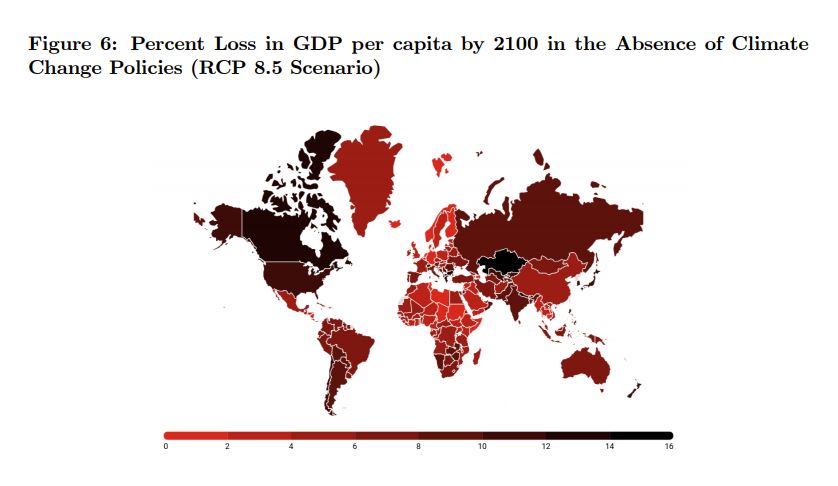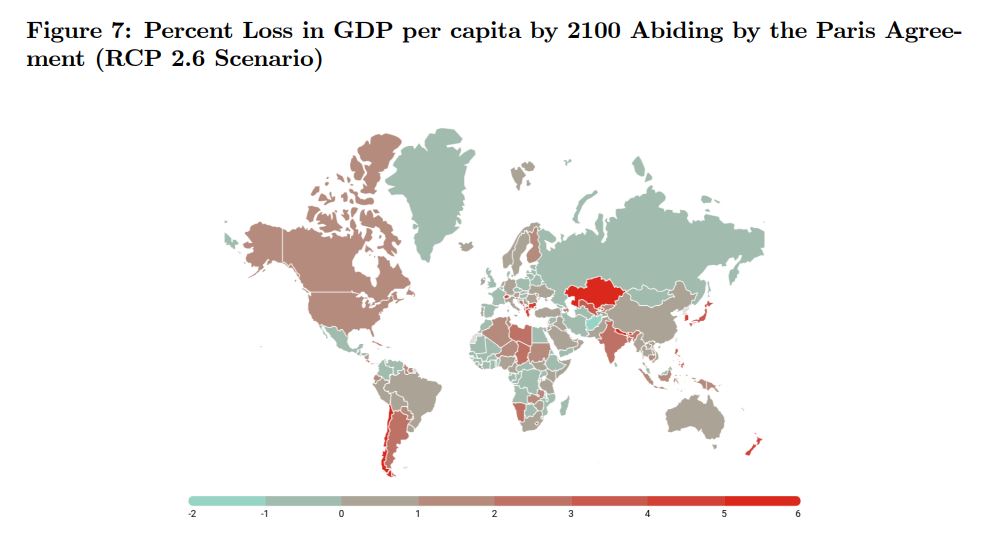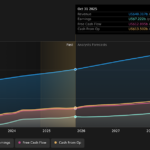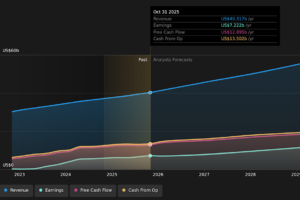Rich, poor, hot or cold, climate change does not discriminate.
Unchecked emissions gains will hurt all economies by 2100 — slowing their retail sectors, crumbling infrastructure, destroying crops, or turning away tourists — researchers at the University of Cambridge and cooperating institutions reported Monday.
Their findings, shared by the National Bureau of Economic Research, belie speculation that wealthier nations might escape the most harmful repercussions of the upward trajectory of carbon emissions, or that warmer temperatures could actually benefit Canada and other industrialized northern nations.
All told, a persistent increase in average global temperature of 0.04°C per year, in the absence of mitigation policies, will reduce world real per-capita GDP by 7.22% by 2100, the researchers say.
The researchers find that abiding by the Paris Climate Agreement, thereby limiting the temperature increase to 0.01°C per year, reduces the loss substantially, to a 1.07% reduction to inflation-adjusted per-capita GDP by 2100.
The team behind the study argues that it isn’t just about the number on the thermometer, but the deviation of temperature from its historical norm — the climate conditions to which countries are accustomed — that determines the size of income loss.
Related: July was officially Earth’s hottest month on record
 Dr. Kamiar Mohaddes, Ryan Ng and collaborators.
Dr. Kamiar Mohaddes, Ryan Ng and collaborators.
The team studied data from 174 countries from 1960 to 2014 but undertook a more focused approach to the U.S. to gauge the strength of their results.
Under a “business as usual” emissions scenario, average global temperatures are projected to rise over 4°C by the end of the century. This would cause the U.S. to lose 10.5% of its GDP by 2100.
“Cross-country studies are important for the big picture, but averaging data at national levels leads to loss of information in geographically-diverse nations, such as Brazil, China or the United States,” said report co-author Dr. Kamiar Mohaddes. “By concentrating on the U.S., we were able to compare whether economic activity in hot or wet areas responds to temperature fluctuations around historical norms in the same way as that in cold or dry areas within a single large nation.”
The team looked at 10 sectors ranging from manufacturing and services to retail and wholesale trade across 48 U.S. states, and found each sector in every state suffered economically from at least one aspect of climate change — heat, flood, drought or freeze.
President Trump in 2017 pulled the U.S. out of the Paris Climate Accord, saying at the time that developing and more recently developed nations, such as economic giant China, didn’t pull their weight when it came to climate policies. Some lawmakers at the time said the cost to the U.S. economy and poorer citizens from reducing fossil fuel use for heat and transportation, at least in the short term, was worrisome.
Read: A funeral for Iceland’s Okjokull glacier, and what are nurdles?
 Dr. Kamiar Mohaddes, Ryan Ng and collaborators.
Dr. Kamiar Mohaddes, Ryan Ng and collaborators.
Canada, which some analysts claim will benefit economically from temperature increase that could expand tourism or open shipping routes, for instance, would lose over 13% of its income by 2100, the Cambridge report finds.
“Canada is warming up twice as fast as rest of the world. There are risks to its physical infrastructure, coastal and northern communities, human health and wellness, ecosystems and fisheries — all of which has a cost,” said Mohaddes. He worked on the study with Cambridge PhD candidate Ryan Ng, as well as colleagues from the University of Southern California, Johns Hopkins University, National Tsing Hua University in Taiwan and the International Monetary Fund.
The research showed that keeping to the Paris Agreement limits the losses of both the U.S. and Canada to under 2% of GDP.
Japan, India and New Zealand lose 10% of their income. Switzerland is likely to have an economy that is 12% smaller by 2100. Russia would erase 9% of its GDP, with the U.K. down by 4%.
Read: Climate change and traditional farming risk creating a global food crisis, UN warns
“The idea that rich, temperate nations are economically immune to climate change, or could even double and triple their wealth as a result, just seems implausible,” Mohaddes said. “The U.K. recently had its hottest day on record. Train tracks buckled, roads melted and thousands were stranded because it was out of the norm. Such events take an economic toll, and will only become more frequent and severe without policies to address the threats of climate change.”













